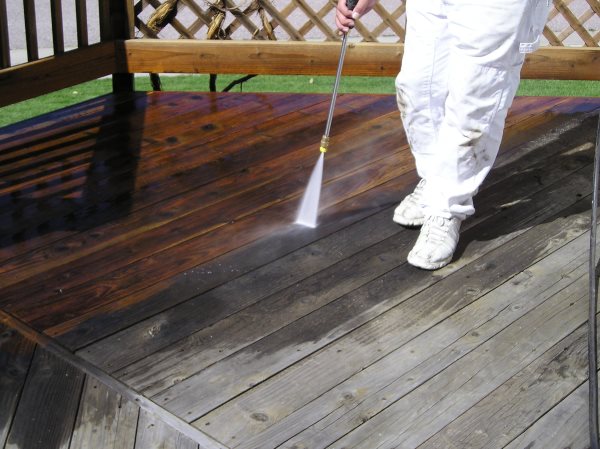No finish will last long if it’s applied to a dirty surface. Deck power washing is an important beginning step, and in some cases the only preparation you’ll need to undertake before staining.
Pressure washing is the single best way to clean your deck or porch.
This method:
- Safely removes dirt and dust.
- Opens wood pores allowing deep penetration of the deck stain or finish.
- Is better than a garden hose for rinsing away chemicals, including bleaches and brighteners.
- Removes many types of staining and discoloration using plain water.
- Safely strips old finishes, including stains and peeling paint.
Pressure washing is a great time saver. But it can also do a lot of damage. Improper form can produce ridges and gouges in the surface of the wood, even harder woods such as oak. The last thing you want is to damage your deck.
Choose the Correct Nozzle and Pressure
Newer pressure washers come with color coded nozzles. Red nozzles have a very narrow spray pattern and can do significant damage if directed straight at a wood deck. The green nozzle delivers a wider spray pattern, but the best nozzle to work with is the white nozzle which usually sprays in a 40-45 degree fan.
1000 to 1200 psi is almost always adequate for wood cleaning jobs. Anything higher than this pressure is likely to cause severe damage.
Practice the Correct Form from Start to Finish
The key to avoiding damage is to use a sweeping motion and keep the nozzle moving at all times. Pull the trigger at the beginning of your first pass, directing the water at an angle that is low to the surface. Think closer to parallel instead of at a right angle.
Working on a swath of wood two boards wide, walk the spray from one end of the deck to the other without stopping. Your second pass will overlap the first; walk back the entire length of the deck. If you need to stop before the entire deck is clean, sweep the nozzle up and away from the deck before releasing the trigger.
In general, keep the wand at least 12 inches away from the surface you are cleaning. This will also reduce the risk of damaging the wood.
Deck Power Washing After Sanding
If your deck has just been constructed, it may seem that the wood is clean enough to skip pressure washing. Looks are deceiving in this case. Mill glaze crushes the surface wood fibers. Sanding dust clogs the pores of the wood. Both of these conditions prevent stain from penetrating effectively.
You’ll be disappointed in the results. Your deck will color unevenly. The finish won’t provide the full protective benefits. In severe cases, the stain will not penetrate at all. It will sit on top of the wood like paint. And just like paint, unabsorbed stain can flake and peel.
If your deck has been freshly sanded, low pressure and plain water are all you need to do the job right. Use a 40 degree spray nozzle (this is the widest one available) and low pressure; 1000 to 1200 psi is more than enough. Hold the nozzle 12 inches from the deck’s surface.
While you’re at it, go ahead and wash off the siding as well. Sanding dust gets everywhere, and some will have inevitably stuck to the side of your house.
Power Washing an Existing Deck
Often, water alone will be sufficient to remove grime, sanding dust, and old finish and restore the wood to like-new condition. In some cases, though, chemicals can produce a cleaner, more uniformly colored surface.
If you’re pressure washing an old deck, consider using a wood restorer or brightener. These formulas can remove mildew, rust and tannin streaks, and even most commercial deck stains, leaving you with a raw surface.


